Growth hormone (GH) has emerged as one of the most researched and controversial topics in modern bodybuilding and athletic performance enhancement. As bodybuilders continuously seek methods to optimize muscle growth, enhance recovery, and improve body composition, understanding the science behind growth hormone’s effects becomes increasingly important. This comprehensive analysis examines how growth hormone can assist bodybuilders, exploring both the potential benefits and significant risks associated with its use.
Understanding Growth Hormone: The Foundation of Anabolic Processes
Growth hormone, also known as somatotropin, is a peptide hormone naturally produced by the anterior pituitary gland. This powerful hormone plays a fundamental role in growth, cell regeneration, and maintaining healthy tissues throughout the body. For bodybuilders, GH represents more than just a growth factor—it serves as a master regulator of multiple physiological processes that directly impact muscle development, fat metabolism, and recovery.
The hormone’s importance extends beyond childhood growth, as it continues to influence body composition, muscle mass, and metabolic function throughout adult life. Natural GH production peaks during adolescence and gradually declines with age, typically reducing by 14% per decade after the second decade of life. This age-related decline has sparked significant interest in GH supplementation among bodybuilders and fitness enthusiasts seeking to maintain or enhance their physical capabilities.
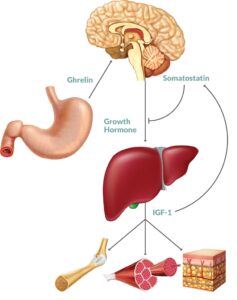
The Biological Mechanisms: How Growth Hormone Works
The GH-IGF-1 Axis
Growth hormone does not act directly on muscle tissue. Instead, it operates through a sophisticated biological pathway known as the GH-IGF-1 axis. When GH is released from the pituitary gland, it circulates through the bloodstream and primarily targets the liver, stimulating the production of insulin-like growth factor-1 (IGF-1). This IGF-1 then becomes the primary mediator of growth hormone’s anabolic effects
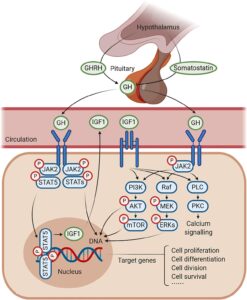
The IGF-1 protein activates several crucial cellular pathways, including the PI3K/Akt/mTOR pathway, which is fundamental for muscle protein synthesis. This pathway enhances the uptake of amino acids by muscle cells, promotes ribosomal biogenesis, and ultimately leads to increased muscle fiber size and strength. Research has demonstrated that IGF-1 can increase skeletal muscle protein synthesis while simultaneously inhibiting protein degradation, creating an optimal environment for muscle growth.
Direct Effects of Growth Hormone
Beyond its IGF-1-mediated effects, growth hormone also exerts direct influences on body composition. GH directly promotes lipolysis, the breakdown of stored fat tissue, which contributes to improved body composition and the lean appearance sought by bodybuilders. The hormone also enhances the utilization of fatty acids for energy, which can be particularly beneficial during cutting phases when bodybuilders aim to reduce body fat while preserving muscle mass
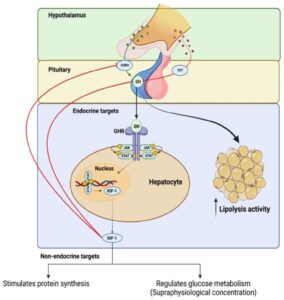
Specific Benefits for Bodybuilders
Lean Body Mass Enhancement
Multiple controlled studies have consistently demonstrated that growth hormone supplementation can increase lean body mass in both healthy adults and those with GH deficiency. A comprehensive meta-analysis involving 303 participants found that GH treatment resulted in an average lean body mass increase of 2.1 kg compared to placebo groups. However, it’s important to note that this increase in lean mass doesn’t always translate to functional strength improvements
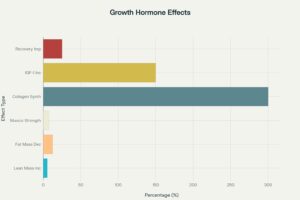
Research specifically examining bodybuilders and athletes has shown that GH can promote muscle hypertrophy through enhanced protein synthesis and reduced protein breakdown. The hormone’s ability to stimulate satellite cell activation also contributes to muscle repair and growth potential. These effects are particularly pronounced when combined with resistance training, as mechanical loading appears to enhance GH’s anabolic effects.
Enhanced Fat Loss and Body Composition
One of growth hormone’s most significant benefits for bodybuilders is its powerful effect on fat metabolism. Studies have consistently shown that GH can reduce total body fat by 10-15% while simultaneously increasing lean mass. This dual effect creates the improved muscle-to-fat ratio that bodybuilders strive to achieve.
The fat loss effects occur through multiple mechanisms. Growth hormone directly stimulates adipocytes (fat cells) to break down stored triglycerides into free fatty acids, which can then be used for energy. Additionally, GH enhances the body’s ability to utilize these fatty acids as fuel, particularly during fasting periods or low-intensity exercise. This metabolic shift toward fat oxidation can be especially beneficial during contest preparation when bodybuilders need to achieve extremely low body fat levels.
Accelerated Recovery and Repair
Recovery enhancement represents another crucial benefit of growth hormone for bodybuilders. GH plays a vital role in tissue repair and regeneration, with most of the body’s natural GH secretion occurring during deep sleep. Studies have shown that adequate GH levels can improve recovery times by 20-30%, allowing for more frequent and intense training sessions.
The recovery benefits extend beyond muscle tissue. Growth hormone significantly enhances collagen synthesis, with studies showing increases of 200-400% in collagen production. This enhanced collagen synthesis benefits tendons, ligaments, and other connective tissues, potentially reducing injury risk and improving overall structural integrity. Research has demonstrated that even local GH administration can stimulate tendon collagen synthesis by up to 130%

Sleep Quality and Hormonal Optimization
Growth hormone and sleep share a bidirectional relationship that can benefit bodybuilders. While 70% of daily GH secretion occurs during deep sleep phases, adequate GH levels also contribute to improved sleep quality. This creates a positive feedback loop where better sleep enhances natural GH production, which in turn promotes better recovery and sleep quality.
Interestingly, research has shown that sleep deprivation can dramatically augment exercise-induced GH release. One study found that GH responses to high-intensity exercise were significantly greater following sleep deprivation compared to normal sleep conditions. While this doesn’t advocate for sleep deprivation, it highlights the complex relationship between GH, exercise, and recovery cycles.
Natural Methods to Enhance Growth Hormone
Lifestyle Interventions
Bodybuilders can optimize natural GH production through several evidence-based approaches. High-intensity interval training has been shown to produce the most significant exercise-induced GH responses. Training protocols that elevate heart rate above the anaerobic threshold for 30-second intervals can substantially increase GH release.
Sleep optimization remains the most important factor for natural GH production. Achieving 7-9 hours of quality sleep nightly, with emphasis on deep sleep phases, maximizes natural GH secretion. Sleep quality appears more important than quantity for optimal GH production.
Nutritional and Supplemental Strategies
Several nutrients and supplements can support natural GH production. Arginine supplementation at doses of 15-20 grams daily can increase nighttime GH levels by up to 60%. However, lower doses (6-10 grams) show minimal effects.
GABA supplementation (1.5-3 grams before bed) has been shown to increase GH levels by 200% during rest and exercise. Melatonin (0.5-5 mg before bed) can increase GH production by up to 157%. Intermittent fasting has also demonstrated significant potential for boosting natural GH levels.
Growth Hormone-Releasing Peptides
Peptide therapies have emerged as alternatives to direct GH administration. Growth hormone-releasing peptides (GHRPs) like GHRP-2, GHRP-6, and ipamorelin stimulate natural GH release rather than supplying exogenous hormone. These compounds may offer similar benefits with potentially reduced side effects and legal risks.
Current Research and Future Directions
Recent research has expanded our understanding of growth hormone’s role in bodybuilding and athletic performance. Advanced detection methods continue to evolve, making illicit use increasingly risky for competitive athletes. Meanwhile, research into safer alternatives, including selective GH receptor modulators and enhanced peptide therapies, shows promise for future applications.
Biomarker research has revealed new insights into individual responses to GH therapy, potentially enabling personalized dosing protocols. Studies examining the interaction between GH, other hormones, and training variables continue to refine our understanding of optimal application strategies.
The development of long-acting GH formulations may improve convenience and safety profiles for legitimate medical applications. However, these advances also raise new questions about detection and regulation in competitive sports.
Conclusion
Growth hormone represents a powerful tool for bodybuilders seeking to optimize muscle growth, enhance fat loss, and improve recovery. The scientific evidence clearly demonstrates GH’s ability to increase lean body mass, reduce body fat, and enhance various aspects of physical performance. However, these benefits come with significant risks, legal considerations, and ethical implications that cannot be ignored.
For most bodybuilders, optimizing natural GH production through proper training, sleep, and nutrition represents the safest and most sustainable approach. High-intensity training, adequate sleep, strategic nutrition, and evidence-based supplementation can substantially enhance natural GH levels without the risks associated with exogenous hormone use.
Those considering GH supplementation must carefully weigh the potential benefits against the substantial risks, legal consequences, and financial costs involved. The decision should be made with full awareness of both the scientific evidence and the regulatory environment surrounding growth hormone use.

Ultimately, growth hormone’s role in bodybuilding reflects the broader tension between performance optimization and health preservation. While GH offers undeniable benefits for muscle growth and body composition, the safest and most effective approach for most bodybuilders involves maximizing natural hormone production through proven lifestyle interventions rather than pursuing potentially dangerous supplementation protocols.
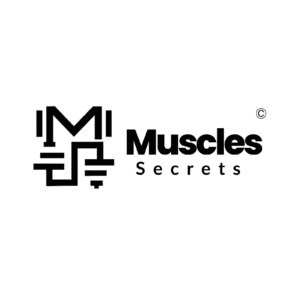


3 Comments
This is exactly what i was looking for, thank you so much for these tutorials
It would be great to try this theme for my businesses
What a nice article. It keeps me reading more and more!